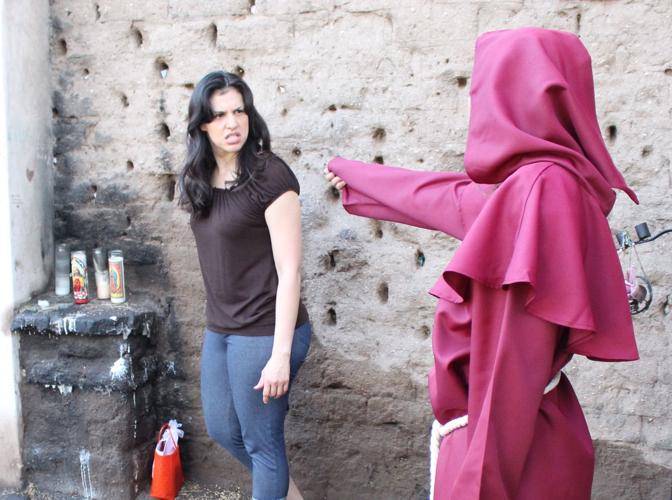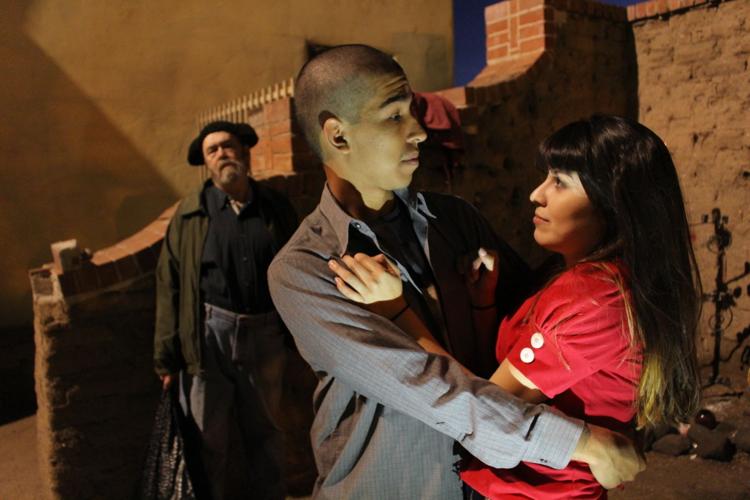How’s this for a city’s nickname: “the capital of murdered women.”
It’s a distinction that belongs to Juarez, Mexico, which is where Borderlands Theater’s play, “The Ghosts of Lote Bravo” takes place.
According to the Council of Hemispheric Affairs, the rise of maquiladoras in that state have contributed to the femicide there. Women from impoverished areas of Mexico flock to the city for jobs. They are given the more lowly chores at the plants and are subject to harassment and assault. When a woman has a low-paying job, she is forced to earn money other ways, often as a prostitute. Women in general get little respect; women who make their livings in what are considered less respectable professions get even less. And sometimes — often — they get murdered. When that happens, it’s not unusual for a body to be dumped in an area of Juarez known as Lote Bravo.
It is murder and that dumping ground, that provide the background for Hilary Bettis’ play, which is receiving a rolling premiere — Borderlands and two other theaters in the National New Play Network are staging the piece. The Borderlands production is the first to open.
The story: The play opens with the teenage Raquel struggling for breath as she lies where she’s been tossed in Lote Bravo. She has been beaten and is dying. La Santa Muerte — a folk saint said to bring safe delivery to the afterlife — cradles her head. Raquel begs for a story, and La Santa Muerte begins to tell her about Juanda, Raquel’s mother. The play quickly shifts scenes as we go back over the days and weeks before this moment of death.
Raquel and her mother, whose husband was murdered, work in a maquiladora, but there is not enough money to provide food for them and Raquel’s little brothers. So Raquel goes out hunting for more work. While she may earn money while on her back, Raquel’s dreams of a life in America, free of violence and hunger never leave her. But there is much to overcome if she is to realize that dream.
The genesis of the play: It was a radio interview with a photojournalist who had documented life in Juarez for years, that launched the idea for Bettis.
“There was something about the way he spoke of the murders, the reverence he had for (the victims), that sparked this obsession about what life was like for them, and why are the murders happening, and the circumstances of the culture that seemed to cause such a level of violence,” said Bettis from New York City, where she writes for the FX television series “The Americans.”
From a woman’s perspective: The women, Raquel and Juanda, have full lives in the script, which is packed with poetic language, deep emotions, and just enough humor to lighten the load.
“I wanted to have a conversation from a woman’s perspective, especially because prostitution is so easily stigmatized,” says Bettis. “In the very patriarchal world, if someone is a prostitute, she is trash, she has no value.”
Raquel, though forced to sell her body so her family can survive, never gives up her goal of her family’s freedom from the devastations of poverty and violence. “I wanted to humanize her and show the audience that she has the right to have a voice, and she deserves to be listened to.”
Raw and vivid: Bettis portrays a devastating world in Juarez, one that’s dominated by organized crime, murder, poverty and desperation. Read the script and you’ll see that her treatment of the city is raw and disturbing. Yet it is difficult to turn away from.
“I really wanted to write this for an American audience,” she says. “I wanted an American audience to actually live in that life. I wanted an audience to not just be rooting for a Mexican to cross illegally, but to really understand why. And I wanted them to look at themselves and ask, ‘if I were living in the same circumstances and I had children, would I do the same thing.’”





